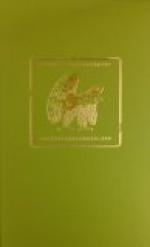Tisdale’s voice broke. He was looking off again into the night, and his face hardened; two vertical lines like clefts divided his brows. It was as though the iron in the man cropped through. The pause was breathless. Here and there a grim face worked.
“When the dog reached the spot,” Hollis went on, “he gave a quick bark and ran with short yelps towards a clump of young trees a few yards off. The rim of a drift formed a partial windbreak, but he had only a low bough to cover him,—and the temperature,—along those ice-peaks—”
His voice failed. There was another speaking silence. It was as though these men, having followed all those hundreds of miles over tundra and mountains, through thaw and frost, felt with him in that moment the heart-breaking futility of his pursuit. “I tried my best,” he added. “I guess you all know that, but—I was too late.”
The warning blast of an automobile cut the stillness, and the machine stopped in front of the clubhouse, but no one at the table noticed the interruption.
Then Banks said, in his high key: “But you hitched his dogs up with yours, the ones that were fit, and brought him through to Seward. You saw him buried. Thank you for that.”
Feversham cleared his throat and reached for the decanter, “Think of it!” he exclaimed. “A man like that, lost on a main traveled thoroughfare! But the toll will go on every year until we have a railroad. Here’s to that road, gentlemen. Here’s to the Alaska Midway and Home Rule.”
The toast was responded to, and it was followed by others. But Tisdale had left his place to step through the open door to the balcony. Presently Foster joined him. They stood for an interval smoking and taking in those small night sounds for which long intimacy with Nature teaches a man to listen; the distant voice of running water; the teasing note of the breeze; the complaint of a balsam-laden bough; the restless stir of unseen wings; the patter of diminutive feet. A wooded point that formed the horn of a bay was etched in black on the silver lake; then suddenly the moon illumined the horizon and, rising over a stencilled crest of the Cascades, stretched her golden path to the shore below them. Both these men, watching it, saw that other trail reaching white, limitless, hard as steel through the Alaska solitudes.
“At Seward,” said Foster at last, “you received orders by cable detailing you to a season in the Matanuska fields; but before you took your party in, you sent a force of men back to the Aurora to finish Weatherbee’s work and begin operations. And the diverting of that stream exposed gravels that are going to make you rich. You deserve it. I grant that. It’s your compensation; but just the same it gives a sharper edge to poor Weatherbee’s luck.”
Tisdale swung around. “See here, Foster, I want you to know I should have considered that money as a loan if David had lived. If he had lived—and recovered—I should have made him take back that half interest in the Aurora. You’ve got to believe that; and I would be ready to do as much for his wife, if she had treated him differently. But she wrecked his life. I hold her responsible.”




